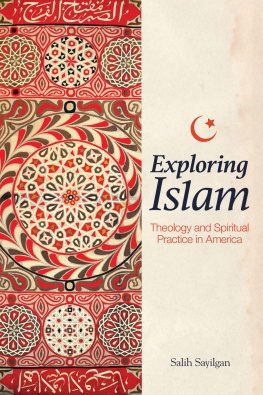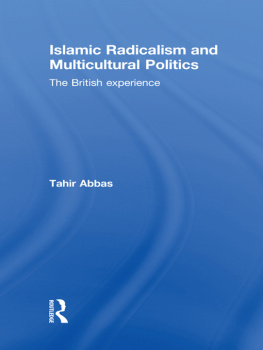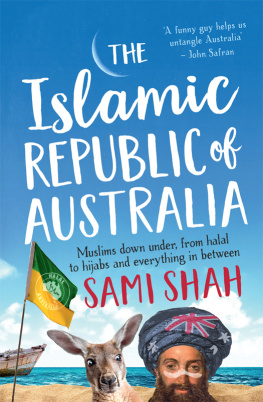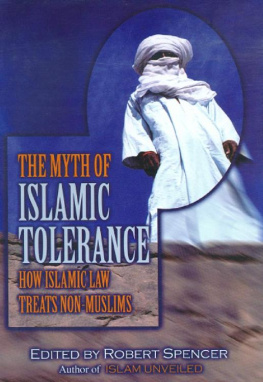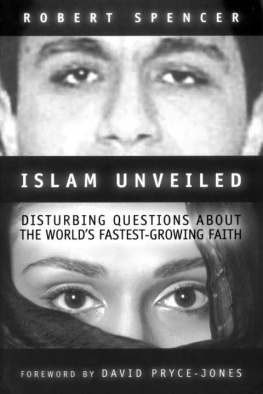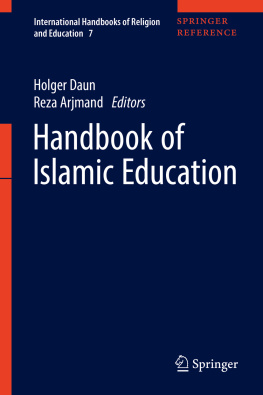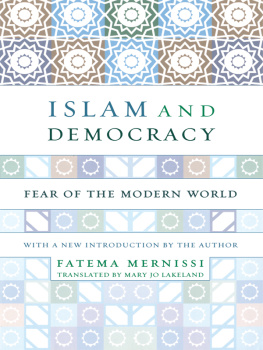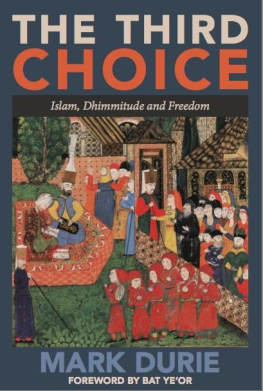2009 Sheema Khan
Except for purposes of review, no part of this
book may be reproduced in any form without
prior permission of the publisher.
We acknowledge the support of
the Canada Council for the Arts for our publishing program.

We also acknowledge support from
the Government of Ontario through the Ontario Arts Council.
Cover design: David Drummond, Salamander Hill Design
ISBN 978-1-894770-82-8
Cataloguing Data available from Library and Archives Canada
TSAR Publications
P. O. Box 6996, Station A
Toronto, Ontario M5W 1X7
Canada
www.tsarbooks.com
Contents
Guide
Introduction
In the fall of 2002, I was asked to write a monthly column for The Globe and Mail, Canadas national newspaper, on issues pertaining to Islam and Muslims, in view of the events of September 11, 2001. Up to that point, I had written a few op-ed pieces for The Globe, The Toronto Star, and the Montreal Gazette on some horrific events overseas. I was struck by the profound vision of Mariane Pearle in face of the murder of her husband Daniel Pearle, and revolted by the naked anti-Semitism of those who committed the depraved act. I was inspired by the indomitable courage of Mukhtar Mai in the face of her brutal tribal rape. As the Israeli-Palestinian conflict raged during the second intifada, I remembered the genuine love extended to me by my Jewish neighbours. The best of human actions in the face of disheartening acts. And so began this venture to write about Islam and Muslims for a Canadian audience, from a Canadian Muslim perspective.
These essays appeared as monthly columns in The Globe and Mail from 2002 to 2009, except for Let Neighbourly Love, which appeared in the Montreal Gazette. My Globeeditors, Patrick Martin and the late Val Ross, encouraged me to write on topics of my choosing. Often, the topics dealt with issues in the news, overseas and local. I tried to provide a nuanced perspective of events, which often elicited thoughtful feedback (along with a few instances of hate mail).
The article about the controversy over the Prophet Muhammad cartoons elicited the greatest response. In it, the stark difference between the irrational actions of some Muslims and the teachings of Prophet Muhammad were highlighted; this turned out to be an eye-opener for many readers.
In addition, Globe readers have provided much valuable feedback that has contributed to my own understanding of Islam, and an appreciation of the diversity of thought in this nation. It has been a privilege to have a national conversation about issues which are important to all Canadians.
Over the years, however, the focus has been primarily on domestic issues such as reasonable accommodation, religiously-based family arbitration, multiculturalism, homegrown terrorism, and the targeting of innocent Muslims by the security services. In short, the spotlight has been on two main features: the struggle between security and civil liberties; and the tension between integration and identity. The latter, I believe, is a dynamic that has not been fully explored. At its heart is a debate which has only begunover the position of Muslim women within Muslim society, and within the larger Canadian society. In particular, there is a gaping chasm between the treatment of women within many Muslim cultures, and the central teachings of the Koran and the Prophetic example.
In the Jan/Feb 2007 issue of the American journal Foreign Affairs, Dominique Mosi of the French Institute of International Relations wrote that contemporary world tensions were not symptomatic of a clash of civilizations, but rather a result of interdependent layers of conflict. One such layer is an emotional clash between cultures of fear and humiliation. Bridging this divide will require a culture of dialogue. Given the Canadian propensity to talk through rather than fight overissues of conflict, our strength lies in the belief that a culture of dialogue transcends these divides. Our common commitment to a culture of human dignity will eventually overcome these mutually antagonistic cultures of fear and humiliation. This should serve us well as we face the challenges of the 21st century.
Sheema Khan, Ottawa, October 2009
The Highjacking of Islam
Was He Not a Human Soul?
The brutal manner in which the American reporter Daniel Pearl was killed is horrific enough. It was even more repulsive to know that Mr Pearl was kidnapped, murdered, and mutilated simply because he was a Jew. As a Muslim who has been involved in fighting discrimination and hate directed at Muslims over the past few years, I thought I knew how destructive hate could be. But Mr Pearls murder in 2002 brought home a chilling reality.
That Muslims, ostensibly fighting for the liberation of their oppressed brethren, seeking to embarrass Pakistani President Pervez Musharraf, would engage in such a barbaric act and murder a man simply because he was a Jew is an affront to Muslims everywhere, and is completely rejected by the very foundations of Islam. As for the bombing a few weeks earlier in Netanya, Israelthe murder of people who were engaged in worship, be it for Sunday service or Passover, is vile, and condemned in Islam. Muslims must denounce such acts in the strongest of terms.
Tariq Ramadan, a philosophy professor based in Switzerland, is one Muslim intellectual who has strongly criticized anti-Jewish sentiment among Muslims. Writing in Le Monde, he said: Much like the situation across the Muslim world, there exists in France today a discourse which is anti-Semitic, seeking legitimacy in certain Islamic texts and support in the present situation in Palestine. This is the attitude of not only marginalized youth, but also of intellectuals and imams, who see the manipulative hand of the Jewish lobby at each turn or every political setback... Nothing in Islam can legitimize xenophobia or the rejection of a human being due to his/her religious creed or ethnicity. One must say unequivocally, with force, that anti-Semitism is unacceptable and indefensible. The message of Islam requires respect of Jewish faith and spirituality as noble expressions of The People of the Book.
He continues; Muhammad constantly taught respect for all human beings, with all their differences. One day, he stood up out of respect when he heard a funeral procession nearby. When told it was that of a Jew, he answered: Was he not a human soul? It is the shared responsibility of Muslim intellectuals to articulate a comprehensive Islamic message that emphasizes personal responsibility and respect for others.
Respect for others seems to be sorely lacking in parts of the Muslim world. Acts of terror and destruction by zealots is contemptible. Yet there is hope. In spite of her personal anguish, the words of Mr Pearls pregnant widow, Mariane, were inspiring: Revenge would be easy, but it is far more valuable in my opinion to address this problem of terrorism with enough honesty to question our own responsibility as nations and as individuals for the rise of terrorism... [I hope] I will be able to tell our son that his father carried the flag to end terrorism, raising an unprecedented demand among people from all countries not for revenge but for the values we all share: love, compassion, friendship and citizenship, far transcending the so-called clash of civilizations.
The universal values enunciated by Ms Pearl are richly entrenched in Islam. Muslims who live in the West are living proof that a society based on pluralism, social justice, and rule of law is not anathema to living the faith of Islam. Such social harmony was also successfully achieved during various periods of Islamic history.
Next page

